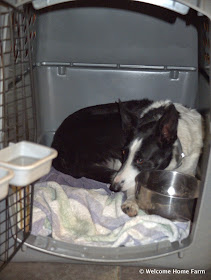It got cold this week, didn't it? Have you been wearing your coat out to recess?
I've been wearing my warm, winter coat every morning out to the barn when I do the chores. The animal's water has been freezing at night so it's time to put heaters in the water barrels. I'll show you some pictures of the heaters next week.
Someone had a good question last week! They asked, "How old is a rooster when he starts to crow?"
Charlie was about 5 months old when he started to crow. Sometimes roosters start to crow when they are about 6 weeks old, but we've never had a rooster crow that young.
Roosters start to grow bigger tail feathers than hens at about 6-7 weeks old. That's usually how we can tell if we have roosters before they start to crow.
I think all our older chicks are hens because they don't have big tails. I'll post some pictures of them again next week.
This week is a listening week!
The other ducks sound like what you think a duck sounds like. Quack, quack! Those are the ducks. A duck is a female duck.
I know that is a little bit confusing, a girl duck is called a 'duck', a boy duck is called a 'drake', but all animals that look like ducks are called 'ducks.'
This is how adults say it:
- The generic term for ducks of all species (male or female) is duck.
- All male ducks (no mater what the species) are called drakes.
- All female ducks (no mater what the species) are called ducks.
- All baby ducks (no mater what the species) are called ducklings.
* * * * *
I hear the chicks peeping, the hen talking to her chicks, and both the female and the male ducks quacking. I also heard the turkeys at the very end!
* * * * *
Do you want to see the new animals we got?
What did you guess last week?
 |
| This is Scout! He is four years old. |
 |
| He likes Bryon, best. |
 |
| This is JJ. She is five years old. |
 |
| She likes me best, but she is timid. |
When people come over that they haven't met before, they both hide. JJ hides in her crate, Scout hides under the table.
Scout and JJ came from Texas to live on our farm. They are both Border Collies who have been trained to help herd sheep. Sometimes we call them, 'the twins' because they look alike.
Can you tell them apart? They are both black and white. What things are different that can help you tell them apart?
They like running in the barnyard and watching the animals. Border Collies don't hurt farm animals, that isn't their job. They are one of the breeds of dogs that farmers and ranchers use to help watch out for and protect the animals on the farm.
Do you have a dog? What kind of dog do you have? Does your dog do tricks? Is it trained to sit and stay?
The next time you write a story you could write a story about your dog and share it with me! What things does your dog do best? What does your dog look like?
If you don't have a dog, you could write about your cat, or you could pretend that you have a pet and write a story about your pretend pet.
Next week I'll show you how we keep the animals' water from freezing. I'll show you what kind of food each animal eats, too. I'll send some baggies to your teacher so you can see and smell and touch most of the kinds of foods that the animals eat.
Can you guess what kind of food I won't send in a baggie?
That's all for this week!
No comments:
Post a Comment